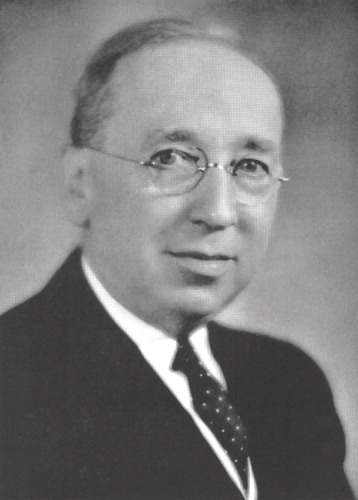Rock Sleyster, M.D., Psychiatry’s First President of the American Medical Association
Of the 158 presidents of the American Medical Association (AMA) to date, there has been only one who was a psychiatrist. Rock Sleyster, M.D., was installed as 93rd president of the AMA on May 16, 1939. At that time, Dr. Sleyster was medical director of the Milwaukee Sanitarium in Wisconsin, a post he held from 1919 until his death in 1942.
Dr. Sleyster was active in organized medicine early in his career and held the offices of president of the Wisconsin State Medical Society, editor of the Wisconsin Medical Journal, AMA delegate, vice-speaker of the AMA House of Delegates, chairman of the AMA Board of Trustees, and then president of the AMA, beginning in 1939. His inaugural address was titled “The Mind of Man and His Security” and vividly pointed out the problems—and the promise—of medicine and psychiatry in that era: 47% of the hospital beds in America were filled with persons with mental diseases, general paresis was just being brought under control, and the treatment of dementia praecox was beginning to see the promise of insulin and metrazol shock therapy (1). Beyond those clinical matters, Dr. Sleyster was concerned about the maintenance of individual initiative versus governmental protections, musing that while the loss of character and individual initiative may not be pathological in the sense that mental defects are pathological, such loss of individual responsibility was a menace not only to the individual but to the nation and mankind as well. Dr. Sleyster had an intense interest in anthropology and published works in that area. He collected rare medical books dating back to 1550, including some of the earliest classic first editions in psychiatry.
In a memoriam, a colleague characterized Dr. Sleyster as “a gentle man; thoughtful, wise, kindly, genial and modest, with a rich sense of humor and scintillating with warmth of personality” (from an unpublished “In Memoriam” by L.H. Zeigler). He died on March 7, 1942. “He had been in his office the preceding day, seeing patients, and had been happy and cheerful—his usual self (Zeigler).” His spouse, Clara, established a memorial fund in his honor through the AMA Foundation, and each year approximately 20 scholarships of $2,500 each are awarded to senior medical students based on demonstrated interest in psychiatry, scholarship, and financial need. These individuals are then designated Rock Sleyster Scholars for a 1-year period. In that sense, Dr. Sleyster’s memory and efforts live on.
Address reprint requests to Dr. Treffert, Behavioral Health Services, St. Agnes Hospital, 430 East Division St., Fond du Lac, WI 54935; [email protected] (e-mail). Photo courtesy of AMA Archives.

1. Sleyster R: The mind of man and his security: president’s address. JAMA 1939; 112:2003–2006Crossref, Google Scholar



